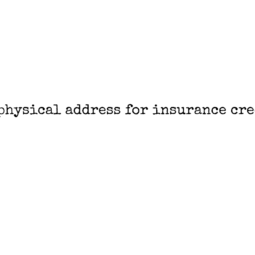Do you need a physical address to be credentialed with insurance companies?
I must get asked this question a dozen or more times per week. And I don’t think you are going to love my answer.
Yes. You need a physical address to be credentialed with insurance companies and here’s why:
Insurance companies require a physical address as part of the credentialing process. Your address serves as your ‘office physical location’ in the state where you wish to be credentialed. In the past certain insurance companies appeared to be waiving this requirement (Hello pandemic!) But now I don’t know of any insurance companies allowing for virtual only.
Amy P.’s thoughts on needing a physical address to be credentialed with insurance companies
So it is not surprising that I am a huge fan of having a physical office if you are going to be an insurance-based RD. That doesn’t mean you HAVE to. However, I do want you to always be informed, so I thought I would share all the information I have acquired about office space as an insurance-based dietitian. I just feel number one it makes you appear more legit. And number two what happens if something does happen with telehealth? Then you have worked your ass off to create something REALLY epic and now need to completely change your model. As a Type A dietitian you can keep your uncertainty. I like certainty and building my empire on a strong foundation.
Options for office space
In my course I have a 9 page document all on different options for office space. I am a girl who likes options and I imagine you do, too. Options for offices addresses vary, including using your home address, renting from a co-working company (like Regus), or obtaining one through a service like iPostal1. Some RDs and CNSs may also sublease space from a local therapist or chiropractor. Personally before I had my current office space I rented from a gym. They had an extra room and I rented it for $250 per month.
However, some addresses may be deemed unacceptable by certain insurance companies. Therefore, I am not endorsing any of the above options. But just simply stating what my experience has been working with HUNDREDS of dietitians in my course who were al l searching for a physical address for insurance credentialing.
For instance, Medicare and other insurers may scrutinize your office space in certain states, while others may identify addresses issued by services like IPostal as non-compliant. Based on my experience with my reimbursement coaching clients it appears that in NJ, PA and certain areas of CA Medicare does in fact come out and check out your physical address for insurance credentialing. However, I am in CT, for the last 15 years and no one has come knocking on my door. So it is kind of a crap shoot. Don’t let this freak you out. Use this information more to prepared and instead empowered.
Other things to consider
While cost considerations may arise, there are options such as renting an address temporarily, subleasing space or gradually saving up for more suitable space as your practice grows.
You have to consider the balance between virtual and in-person visits based on patient preferences and payment discrepancies. In my practice, we see about 60 percent of our patients virtually and 40 percent in person. Some patients want to only be seen in person. I know RDs only want to be virtual. But that may not be the best option for your patients. And your patients do pay your bills.
In some areas, in-person visits may be more financially viable due to higher pay rates or fewer cost-sharing requirements for patients. In PA, TX and MA certain plans DO pay less for virtual visits. I know MA is working really hard to fight this as are PA and TX. However, this is the current climate.
Being informed and educated about insurance credentialing can help you make informed decisions about integrating insurance into your practice. I am a HUGE fan of doing things right the first time. While you may not have loved my response. I hope you found this information helpful.




Reader Interactions
Have you heard of people having issues because their office is designated as a Commercial Mail Receiving Agency (CMRA)? The group working on my credentialing is telling me because the shared office space I use is designated in this way that insurance payers ill not allow enrollment. It seems like there are many avenues to show that I have a physical space here (lease, photo of directory, letter, etc). Any info you have would be appreciated.
Yes- generally the insurance companies want a REAL address that is an ADA compliant office pace — you would not counsel patients at a CMRA — therefore you need a real location to serve as your office